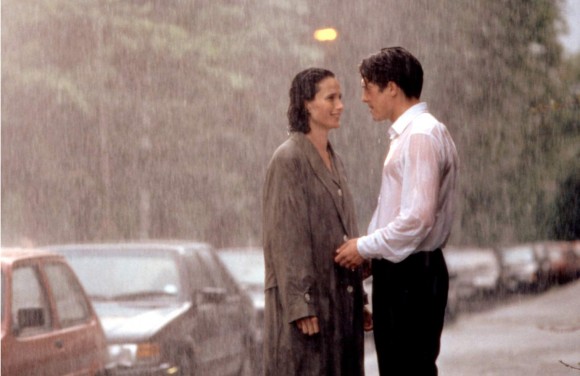
The Big Sick follows its formula, but it works. Photo courtesy of Lionsgate.
One of the worst things that can be said of a film (or your script) is that it’s too formula. This is a common criticism among reviewers, audiences and probably even members of your writing group. This criticism is taken so seriously that I’ve seen young writers doing everything in their power, and wasting a lot of time, trying to avoid formula and instead be original. So let’s get one thing out of the way right off the bat…
You Cannot Be Original
It’s foolish to attempt to be original. The sheer number of films written before you sat down and typed FADE IN: makes originality impossible. What you want to be is fresh. You want to be writing things that haven’t been seen in a while. You want to write scripts that turn convention on its head. And you want to combine elements in ways that other writers haven’t thought of. But you don’t want to reinvent the wheel because…
Even If You Could Be Original You Don’t Want to Be
If you think about your own movie-going experience you’ll realize that what an audience wants is for a film to meet their expectations. If you’re expecting a comedy, there should be jokes. If you’re expecting a horror flick there needs to scares. It’s that simple. Except it really isn’t. Your audience wants to get exactly what they’re expecting and they want to be surprised while they get it.
So What’s the Real Problem with Formula?
Why is it such a cutting criticism to say that a film is too formula? Well, what this criticism really means is that the formula is showing. It’s not that the writer shouldn’t have used a formula it’s that they didn’t cover it up well enough. How do you cover up formula? You write fresh, interesting characters who we don’t see every day. You write great, unforgettable scenes. You look at the way things are traditionally done and turn things on their head. That’s how you hide your formula, and how you surprise and audience.

Hugh Grants proposes in the rain in Four Weddings and a Funeral. Photo courtesy PolyGram Filmed Entertainment.
A great example of this—though it is an older film—is the proposal scene from Four Weddings and a Funeral. It’s very common in romantic comedies for the male lead to propose marriage to the female lead. But in this film, the male lead proposes that they not get married, that they share their lives without marriage. The scene is completely formulaic; the execution is not.
Does Formula Really Work?
Absolutely. A film formula that’s been in use since the days of silent films is boy meets girl—boy gets girl—boy loses girl—boy gets girl back. This formula was recently used to great effect in the film The Big Sick. When you watch the movie it doesn’t feel formulaic because the scenes are very specific and very personal to the writers. The film is based on things that really happened to them, and yet it is still a formula film.
In the event that someone says your script is too formula, what you need to do is not reject formula. Instead, you need to look at all of the other elements to see what you need to strengthen. Like many of the notes you’ll receive, it’s a note that’s not about what it seems to be about.
Try It You’ll Like it
One of the ways to use formula that may not be apparent is to take the formula from one type of movie and apply it to another type. If you take the recent film, Megan Leavey, on the one hand, it’s a pretty straight-forward bio-pic and follows the rules of that genre. On the other hand, it also follows the rom-com formula used in the Big Sick except, this time it’s girl meets dog—girl gets dog—girl loses dog—girl gets dog back.

Kate Mara falls for her dog in Megan Leavey. Photo courtesy Bleeker Street Media.
So, what are your favorite movie formulas?




6 Replies to "How to Make Formula Your Friend"
Kate Pack October 26, 2017 (11:36 am)
Thank you for this clarity. Put in simplest terms. Can use immediately.
Marshall Thornton October 26, 2017 (11:41 am)
Thanks for the comment. Glad you found it useful. 🙂
Miguel mickey Gonzalez October 26, 2017 (9:41 pm)
during and trying to be a young screenwriter one of my notes how it help me to be fast in screenwriting & writing one of my drafts is “a Formula” . The reasons can be a little different than yours but that is a good idea to enhance a screenwriter’s talent.
Marshall Thornton October 27, 2017 (10:23 am)
Thanks for the comment.
Kate November 20, 2017 (9:48 am)
“If you think about your own movie-going experience you’ll realize that what an audience wants is for a film to meet their expectations.” I think this is absolutely true… until it isn’t. Until someone comes up with something that people never knew they wanted. You can fulfill an expectation that a comedy will be funny without fulfilling an expectation of the same formula we’ve seen over and over.
Look at VR films and 360 films, their stories won’t be told like television or movies now, and they shouldn’t be. The definition of television itself is undergoing a massive overhaul as streaming takes over and we start to ‘binge’ episodes like novels. As the medium expands, so can our definition of good storytelling. Also, foreign films and television don’t conform to our idea of what a movie or a tv show episode ‘should be’. That’s actually a draw for many people to those films – not a deterrent.
I definitely think there’s merit in taking the film formula and applying it in fresh and unique ways, but I also think that it isn’t the end-all-be-all, and that if we look around at both history and the rest of the world, we can see truth in that too.
Marshall Thornton November 20, 2017 (12:22 pm)
Thanks for the comment. I think you have a point about new media, however, new media builds on old media. A hundred years ago, D.W. Griffith lifted most of his editing techniques from Charles Dickens’ novels in a sense adapting Dicken’s formula. And, of course, Joseph Campbell and Chris Vogler have had a lot of interesting things to say about how formula goes all the way back to when we were telling stories around a fire.
Formula does evolve, though. The Greeks were quite happy to have their plays end with a God coming on stage and resolving everything. Today we find that kind of Deus ex Machina quite unsatisfying.